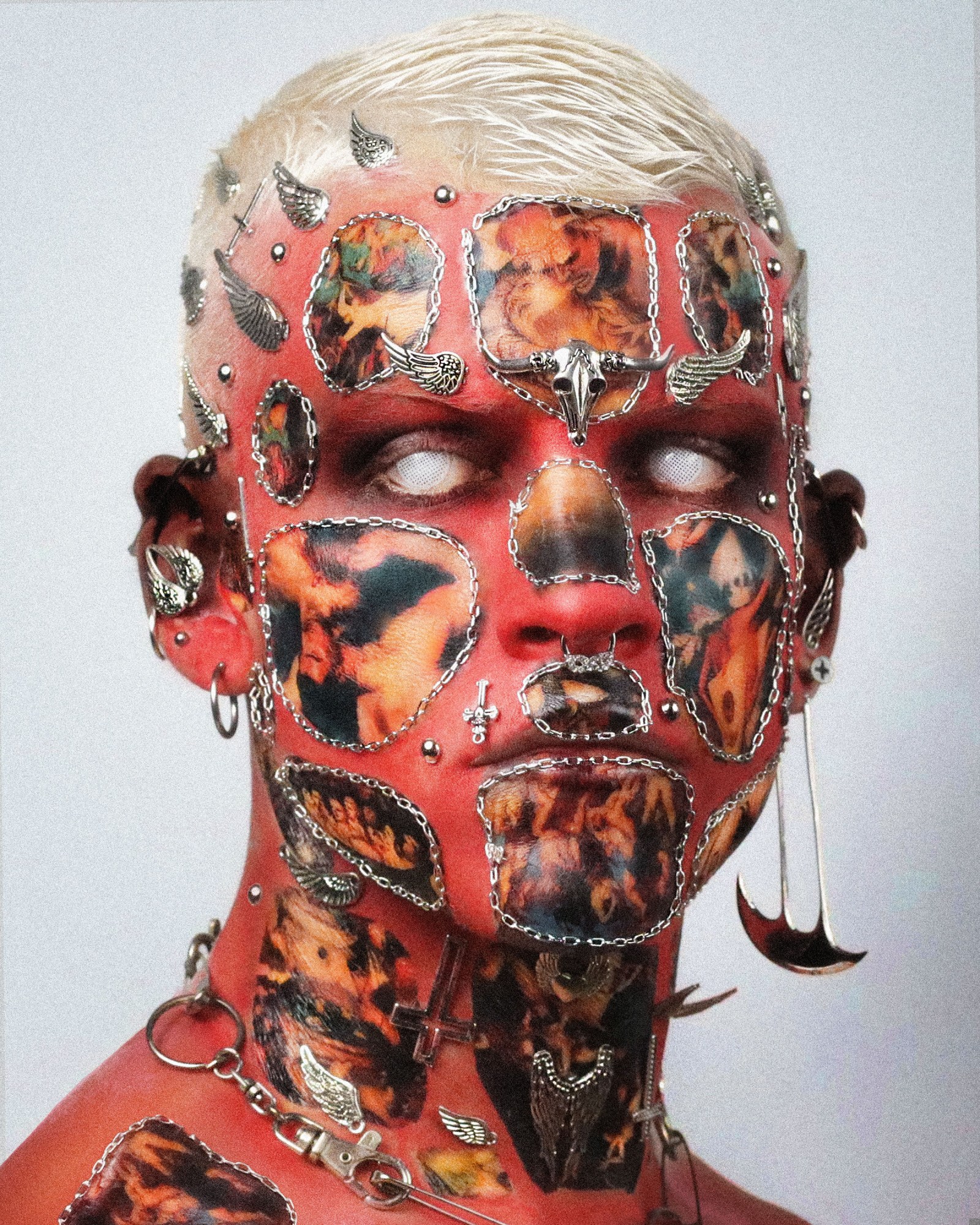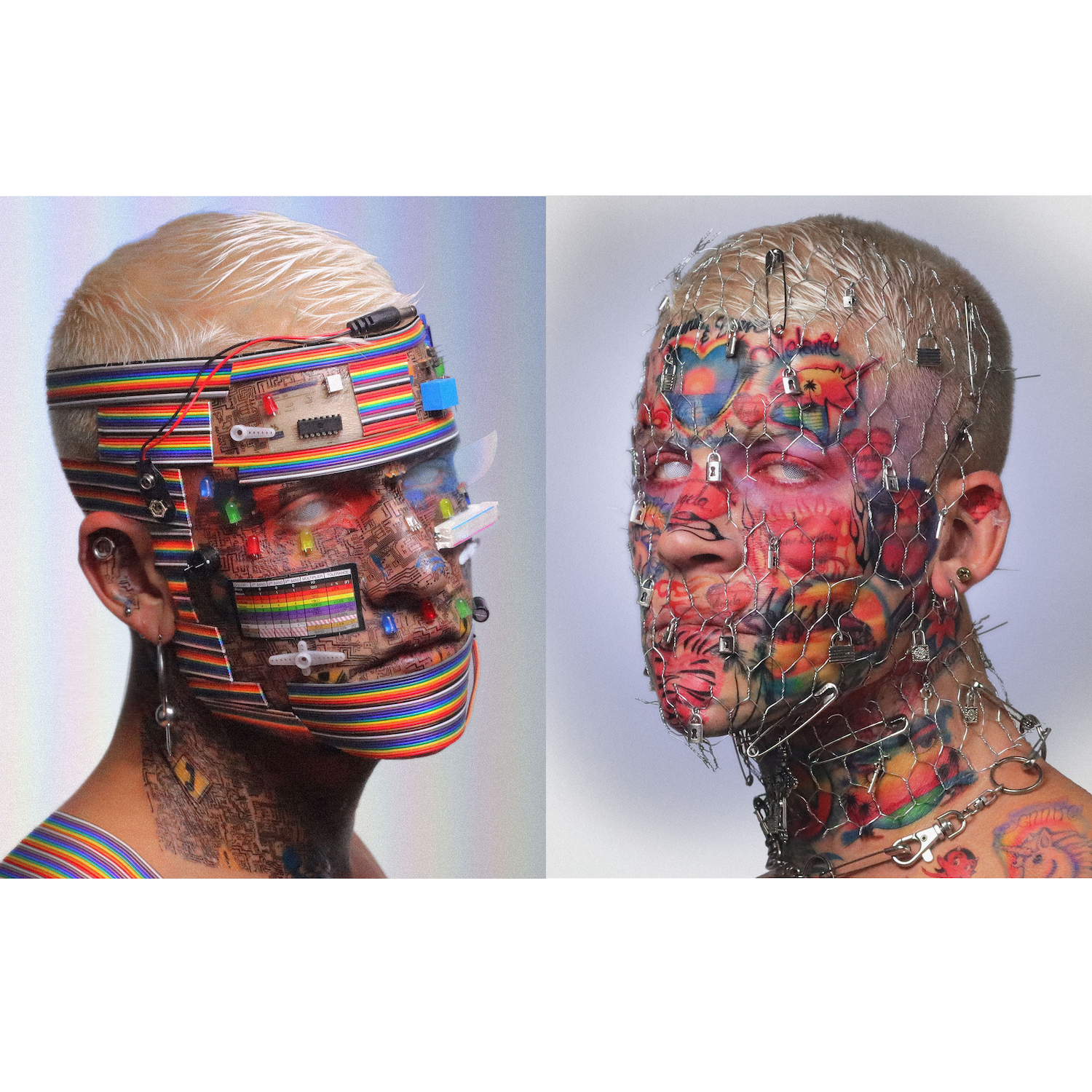Artist Austin Smith first started experimenting with his extravagant masks in 2016. He worked on perfecting his beautifully gory looks for New York nightlife parties like Lady Fag’s Holy Mountain and eventually began posting them to his @empty.pools Instagram account. Over the years, the elaborate masterpieces, made with materials like fake blood, chicken wire, glass, and piercings, have attracted him a notable following.
But before all the followers, Smith was a young punk kid with a love for graphic tees. He’d make outfits by sewing together fabrics that he had screen-printed. He went on to chase a career in textile and print-making after attending the School of the Art Institute of Chicago, but realized that working in a textile design factory covered in sweat and paint wouldn’t wholly satisfy his creativity. Slowly, Smith made his way into surveying the different ways of bringing his ideas to life. And before long, he’d introduce a fresh way to wear and photograph jewelry, headpieces and various unconventional objects like pearls, metal, and paint.
Smith views his art practice as one that exposes what’s not under the mask, but what’s beneath himself: a physical manifestation of how he’s feeling, which ultimately becomes therapeutic. He allows his emotions to exist on the designs he decorates his face, only then exposed to his expertly-curated feed and now 100K+ followers on Instagram.
His username, “empty.pools” was inspired by a song he really liked by the musician Shlohmo. But, an underlying meaning of what Smith said some call his drag-like persona, empty.pools, represents less about its name and more about the internet.
“You can have access to anything in the world online or through these channels and you can see it in front of your face, but it’s not actually there,” Smith said. So, Smith’s concept is that, while a pool is meant to exist as something for fun and for celebration, the pool is empty. It’s there, staring up at you, and you can’t enjoy it.

I asked Smith about his mindset and what the creation process of a look that he might upload to Instagram is like. He said it’s all about purpose and planning, what he can do versus what we can’t and how delving into his brain might offer the ability to make something so sublime not impossible.
“I like to explore different types of aesthetics,” Smith said. “If I’m feeling crazy, sometimes, for me, the best thing is to just do something crazy, make something crazy. It’s almost like getting it out and actually having it be on the forefront of myself. [For a look], I have the idea first, then I figure out the skill-set needed to do it second.”
For his “Technologic” look, he striped a rainbow pattern to his forehead, and draped it down around his jawline and his chin. Tiny multicolored lights pop around the center of his face, all placed above what projects a computer board or map. He is the machine, the power source. Then there’s “Love Lockdown”, an elevated, campy troupe of airbrushed tattoos — a unicorn, Hello Kitty, a heart — that mix the whimsical nature, Renaissance-esque and all-around dark ambiance that Smith utilizes to inspire and generate his work.
He makes all his own designs. He produces the looks, from IRL to social media. He takes his own photos in his apartment (thank you self-timer), and he edits them on his computer. He’s used scar wax to create special effects for looks like “Under the Skin” — a “first” that tricks you into thinking he actually stuck sharp spikes through his cheeks. His images pull you in, but push you away — an almost shock effect caused from the beauty and the gross — and help depict Smith’s fearless approach in expressing himself fully and artistically.
Performance in the public eye isn’t without backlash, however. Comments claiming he’s an alien or from hell — or that his art isn’t art — drives a continued conversation around peoples’ different interpretations of what art actually is. He breaks boundaries, and, with dedication, birthed his own rejection to pre-prescribed ideas of what art should or shouldn’t be.
“I like the fact that I’m so ‘other,’ I guess,” said Smith. “And I like that people like that. You don’t have to place restrictions on yourself.”
